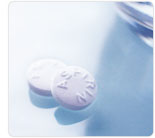
Nearly all oral preparations of postmenopausal hormones (PMHs) increase levels of C-reactive protein (C-RP) which indicates inflammation, within around 28 days of beginning therapy. This increase is obvious in the menopausal woman who is given either estrogen hormones alone or estrogen hormones combined with a progestin, which has now become the most frequent preparation of postmenopausal hormones used. The information below is taken from observational studies and randomized trials of the seemingly healthy menopausal woman and suggests that the increase is not caused by atherosclerotic burden, other risk factors for cardiovascular disease or other inflammatory disorders.
Increased levels of C-RP foresee increased possibility of consequent cardiovascular events in the menopausal woman and in men, but the means by which this occurs are inexact. In a few reports, aspirin therapy has decreased levels of C-RP and other inflammatory cytokines in the menopausal woman. It is indefinite whether or not aspirin therapy at lower or higher doses prevents the postmenopausal hormones-induced rise in C-RP levels in the menopausal woman. A new examination of 10 menopausal women who were taking aspirin therapy showed no change in C-RP levels with postmenopausal hormones therapy.

If the suggestion that aspirin inhibits the postmenopausal hormones-induced increase in CR-P levels is correct, then there are various clinical considerations. Regarding postmenopausal hormones, observational studies and randomized trials show increases in HDL cholesterol levels and reductions in LDL cholesterol levels in the menopausal woman. Observational epidemiological studies continue to show that a menopausal woman who chooses her own postmenopausal hormones hrt proteintherapy has a lower risk of coronary heart disease. Yet, the HERS study and Women's Health Initiative randomized trial with clinical end points imply rather bigger risks within the first 24 months of therapy.
In terms of aspirin's ability to stop the postmenopausal hormones-induced rise in C-RP levels in the menopausal woman, a daily dosage of around 81mg is presently recommended for primary and secondary prevention. Doses of around 650 mg/d will lead to more undesirable effects, but there may also be extra benefits based on other means of action beyond any antiplatelet effect.
If aspirin therapy does indeed prevent the postmenopausal hormones-induced increase in C-RP levels, this might imply a possible abolition of the early increase in cardiovascular events mentioned in both the HERS study and the Women's Health Initiative. So, if the menopausal woman taking postmenopausal hormones holds onto the possible long-term benefit of aspirin therapy, achieves the long-term benefit and has any early increase in events abolished by such therapy then this could have dramatic impact clinically and publically. Therefore, aspirin therapy has the potential to create a more desirable benefit-risk ratio of postmenopausal hormones therapy and this warrants thorough testing.